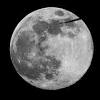Ukraine says it struck one of Russia's most advanced warplanes

KYIV, Ukraine -- Ukraine on Sunday said its forces hit an ultra-modern Russian warplane stationed on an air base nearly 600 kilometers (370 miles) from the front lines.
Kyiv’s main military intelligence service shared satellite photos it said showed the aftermath of the attack. If confirmed, it would mark Ukraine's first known successful strike on a twin-engine Su-57 stealth jet, lauded as Moscow's most advanced fighter plane.
In one photo, black soot marks and small craters can be seen dotting a concrete strip around the parked aircraft. According to the Main Intelligence Directorate of Ukraine’s Ministry of Defense, the strike took place on Saturday at the Akhtubinsk base in southern Russia, some 589 kilometers (366 miles) from the front line.
The Ukrainian agency said the plane, which is capable of carrying stealth missiles across hundreds of kilometers (miles), was among “a countable few” of its type in Moscow's arsenal. According to reports by Russian agencies, Moscow's air force obtained “more than 10” new Su-57s last year, and has placed an order for a total of 76 to be delivered by 2028.
A spokesman for Ukraine’s military intelligence, Andriy Yusov, hours later said on Ukrainian TV that the attack may have damaged two Su-57 jets parked at the base, and also wounded Russian personnel. He did not immediately give any evidence to support the claim.
Ilya Yevlash, a spokesman for Ukraine's air force, told Ukrainian media in April that Moscow was trying to keep its Su-57 fleet “at a safe distance” from Ukrainian firepower.
The strike comes after the United States and Germany recently authorized Ukraine to hit some targets on Russian soil with the long-range weapons they are supplying to Kyiv. Ukraine has already used U.S. weapons to strike inside Russia under newly approved guidance from President Joe Biden that allows American arms to be used for the limited purpose of defending Kharkiv, Ukraine’s second-largest city.
But the airstrip's distance from Ukraine, as well as unofficial comments from Russia, point to the likely use of Ukrainian-made drones. Since Moscow’s full-scale invasion more than two years ago, Kyiv has ramped up domestic drone production and used the munitions to strike deep inside Russia. In January, drones hit a gas terminal near St. Petersburg that lies over 1,000 kilometers (620 miles) north of the border.
A popular pro-Kremlin Telegram channel, thought to be run by a retired Russian army pilot, claimed that three Ukrainian drones struck the Akhtubinsk airstrip on Saturday and that flying shrapnel damaged the jet.
“It is now being determined whether it can be restored or not. If not, it would be the first combat loss of a Su-57 in history,” the Fighterbomber channel reported.
A military correspondent for Russia's state-run RIA news agency, Aleksandr Kharchenko, in a Telegram post Sunday denounced Moscow's failure to build hangars to protect its aircraft. But the post stopped short of directly acknowledging the strike.
Russia's so-called “military bloggers” like Fighterbomber are often seen as sources of information on military losses in the absence of an official Kremlin comment. Russia's Defense Ministry or senior political figures did not comment Sunday.
The ministry on Saturday claimed its forces downed three Ukrainian drones in the Astrakhan region, home to the Akhtubinsk airstrip. Igor Babushkin, the governor of Astrakhan, that same day reported that Ukraine attempted to strike an unspecified facility there, but claimed the attack was unsuccessful.
Russia's Su-57 fleet has been largely absent from the skies over Ukraine, and has instead been used to fire long-range missiles across the border. The U.K. Ministry of Defence said in an intelligence briefing last year that Russia is likely trying to avoid “reputational damage, reduced export prospects, and the compromise of sensitive technology" that would come from losing any Su-57 jets in enemy territory.
Elsewhere, Ukrainian forces kept up drone attacks on Russia's southern border regions, according to local Russian officials.
Three drones hit Belgorod province late on Saturday, damaging a power line and blowing out windows but causing no casualties, said Gov. Vyacheslav Gladkov. Another five drones and a Ukrainian-made missile were brought down over the region on Sunday, the Russian Defense Ministry said.
According to an update by Pepel (Ashes), a channel run by Belgorod journalists now based outside Russia, Ukrainian drones on Sunday afternoon struck an ammunition depot outside the town of Rakitnoye, some 35 kilometres (22 miles) from Ukraine. Footage circulating on social media showed thick plumes of smoke rising into the sky. In one video, a woman’s voice is heard, saying “I wonder if soldiers lived there?”
Gladkov, the governor, did not directly comment on those claims, but confirmed that a blaze had broken out in a “non-residential building” near Rakitnoye. He said no one was hurt.
Across Ukraine’s front-line provinces, Russian shelling killed at least three civilians and wounded at least nine others on Saturday and overnight, according to reports by regional officials.
A man died and two women suffered wounds in the village of Khotimlya, east of Kharkiv, Gov. Oleh Syniehubov said. Shelling also damaged the local school, a council building, a shop and private homes, Syniehubov said.
Heavy battles continued in the area as Ukrainian troops try to beat back Russia's invading forces after a weekslong push by Moscow that sparked fears for Kharkiv, located just 20 kilometers (12 miles) from the Russian border, and a wave of civilian evacuations.
Russia’s coordinated new offensive has centered on the Kharkiv region, but seems to include testing Ukrainian defenses in Donetsk farther south, while also launching incursions in the northern Sumy and Chernihiv regions.
The easing of restrictions on the use of Western weapons will help Ukraine protect Kharkiv by targeting Russian capabilities across the border, according to Ukrainian and Western officials. It is unclear what other impact it may have on the direction of the war, in what is proving to be a critical period.
The move drew a furious response from Moscow, and warnings it could embroil NATO in a war with Russia. But Jake Sullivan, Biden's national security adviser, described it as “common sense.”
“What was happening up around Kharkiv ... was a Russian offensive where they were moving from one side of the border directly to the other side of the border, and it simply didn’t make sense not to allow the Ukrainians to fire across that border, to hit Russian guns and emplacements that were firing at (them),” Sullivan said Sunday in an interview with CBS's “Face the Nation.”
___
Kozlowska reported from London.
___
Find more of AP’s coverage at https://apnews.com/hub/russia-ukraine


 United Kingdom
United Kingdom Argentina
Argentina  Australia
Australia  Austria
Austria  Brazil
Brazil  Canada
Canada  Germany
Germany  Ireland
Ireland  Italy
Italy  Malaysia
Malaysia  Mexico
Mexico  New Zealand
New Zealand  Poland
Poland  South Africa
South Africa  United States
United States 
























